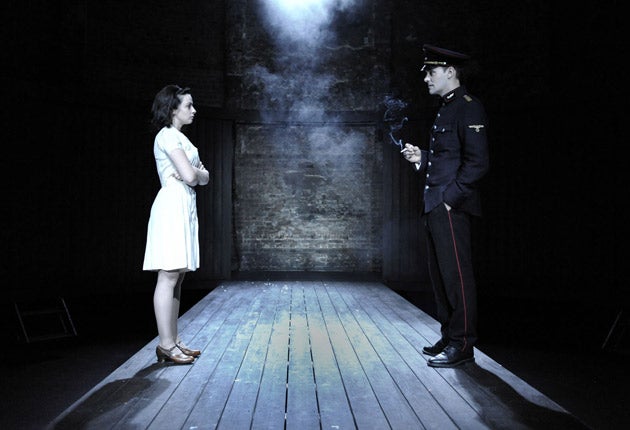Judgment Day, Almeida Theatre, London
A thrilling brief encounter

Your support helps us to tell the story
From reproductive rights to climate change to Big Tech, The Independent is on the ground when the story is developing. Whether it's investigating the financials of Elon Musk's pro-Trump PAC or producing our latest documentary, 'The A Word', which shines a light on the American women fighting for reproductive rights, we know how important it is to parse out the facts from the messaging.
At such a critical moment in US history, we need reporters on the ground. Your donation allows us to keep sending journalists to speak to both sides of the story.
The Independent is trusted by Americans across the entire political spectrum. And unlike many other quality news outlets, we choose not to lock Americans out of our reporting and analysis with paywalls. We believe quality journalism should be available to everyone, paid for by those who can afford it.
Your support makes all the difference.Judgment Day is a fascinating drama about guilt and the compulsion towards conformism in small communities. It was written by a man whose morally awkward position may well have given him cause to reflect painfully on both subjects.
Odon von Horvath was an anti-Nazi writer who, instead of emigrating like so many of his colleagues, remained in Berlin in the 1930s in order to study National Socialism at first hand. The result was a flow of work bearing invaluable witness to the mean, petty mentality of everyday life under the Third Reich.
His great English advocate, Christopher Hampton, has already translated three of his dramas for the stage and made him the hero of his own play, Tales from Hollywood, which imagines Horvath surviving his death in 1938 and joining the celebrated German émigré authors in Los Angeles. His trenchant new version of Judgment Day is brought to life now in a creepily atmospheric production by James Macdonald at the Almeida, which powerfully communicates the play's thriller-like tension, haunted soul, and mordant humour.
The protagonist is Hudetz, a dutiful, well-liked station master, finely played by a pained, upstanding Joseph Millson. Momentarily distracted by a young woman, he fails to change the signal when an express train is approaching, causing a catastrophic crash. He escapes the blame for this by lying under oath, backed by the girl who perjures herself on his behalf. Punctuated by the nerve-shredding jangle of signal alarm bells, the play explores the psychological disintegration of this couple and the fickle swings of the townsfolk, as it builds to the moment when, after a macabre visit from his ghostly victims, Hudetz hands himself in.
Highlighting the peevish claustrophobia of the community, Macdonald crams much of the action onto a narrow trestle stage that serves as the station platform and rotates to form various interiors, such as the inn where the grotesque welcome home party for the released Hudetz takes place. There's a shuddering noir-like feel and a slow, heart-thumping pace to the scene below the viaduct where Laura Donnelly, superbly taunting as the girl, almost wills Hudetz into murdering her so as to silence her tortured conscience and prove to him how far into actual evil he will go in order to secure the punishment he subconsciously craves.
In balefully comic contrast to this mental turbulence, there's the flat, matter-of-fact rancour of the townsfolk who bovinely swap one hate-figure for another. They first amass against Hudetz's shrewish, older wife (Suzanne Burden) who testifies against him. Then they form a mob against Hudetz. The most sympathetic character is the chemist (David Annen) who struggles to recognise that there's a complex web of blame behind the accident. But, as the gloating village gossip tells him, that's the kind of high-mindedness that can get a man lynched in these parts.
To 17 October (020 7359 4404)
Join our commenting forum
Join thought-provoking conversations, follow other Independent readers and see their replies
Comments